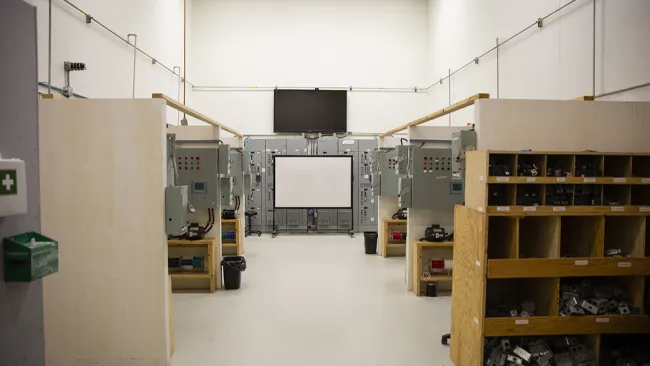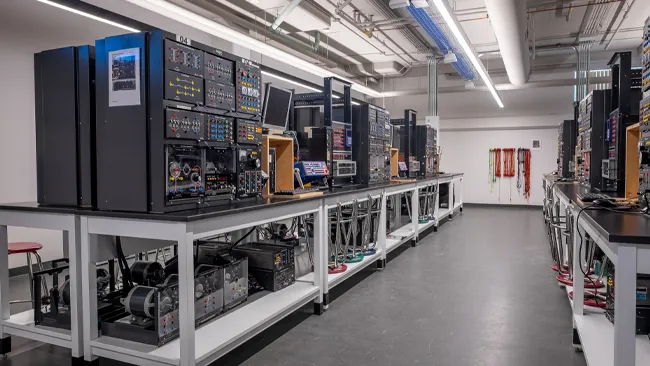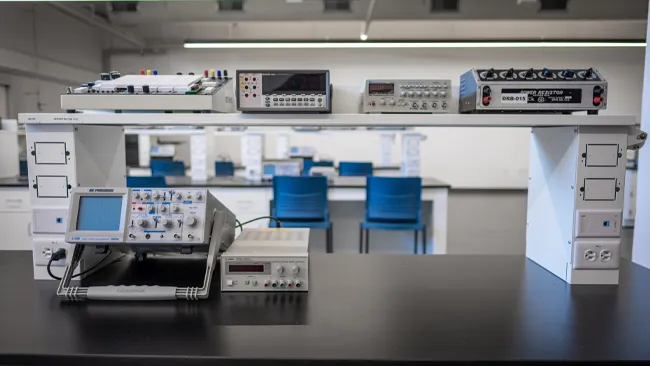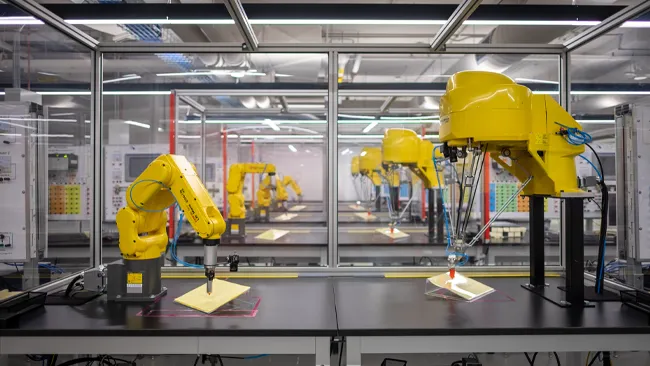
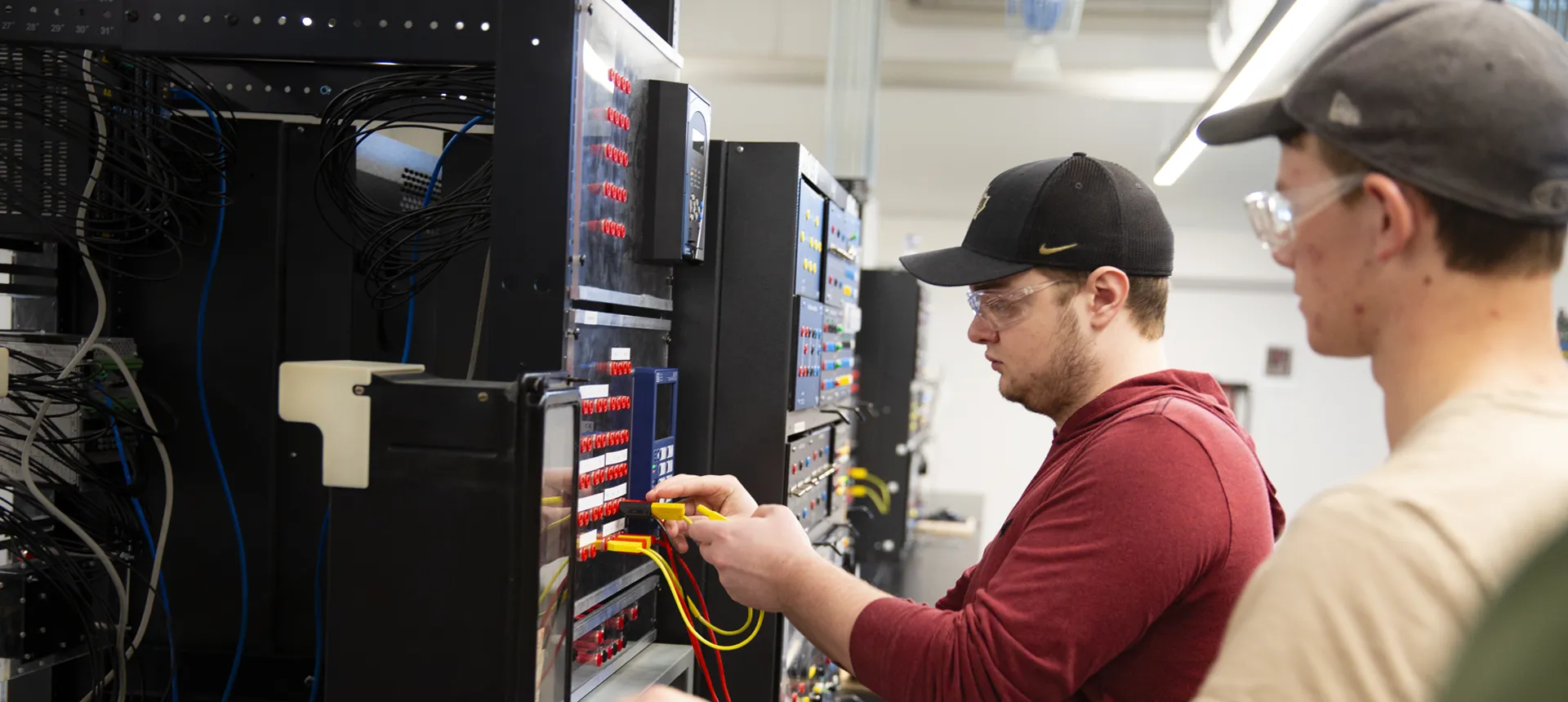
Electrical Engineering Technician - Power Distribution & Control
CIP Code: 15.0303
Overview
Are you interested in how electricity works and how to control it? Discover a rewarding and exciting career in the electrical field.
With more reliance on electricity and electrically powered devices, there is a greater need for skilled electrical workers with a wide variety of electrical experiences and knowledge. Lambton College's Electrical Engineering Technician - Power Distribution & Control program prepares students for a career in the rewarding and extensive electrical field.
Working both in the classroom and in various lab and shop settings, students gain practical, hands-on experience along with strong theoretical training in electrical fundamentals.
This program teaches students how electricity works, how to wire and program PLCs, control strategies, power generation, distribution and protection, the wiring of residential, commercial and industrial circuits, interpreting electrical codes, and how electronics and instrumentation devices are used in today's high-tech world, along with many other electrical tasks.
The optional co-op provides students with the opportunity to gain important electrical experience and in many cases, co-ops are the beginning of a rewarding, full-time career. There are many student success stories of graduates extending their co-op into a full-time career. This course diversifies the student, and includes: automation control, project management, and the distribution and control of power.
Why Choose Sarnia
Admission Requirements
O.S.S.D. or equivalent with:
- Grade 12 English C or U
- Grade 12 Mathematics C or U
- Grade 11 or 12 Physics C or U (recommended)
Grade 12 Mathematics Requirement
Grade 12 Mathematics for College Technology or any grade 12U mathematics is recommended; Grade 12 Foundations for College Mathematics (MAP4C) minimum final grade is 60%. If the program is highly competitive, students with Grade 12 Mathematics for College Technology or any Grade 12U mathematics will be given preference.
The admissions process is competitive and meeting the minimum academic requirements does not guarantee admission.
Lambton College reserves the right to alter information including admission requirements and to cancel a program or course at any time; to change the program curriculum as necessary to meet current competencies or changes in the job market; to change the pathways to third-party certification bodies; or to withdraw an offer of admission both prior to and after its acceptance by an applicant or student because of insufficient applications or registrations or over-acceptance of offers of admission. In the event Lambton College exercises such a right, Lambton College's sole liability will be the return of monies paid by the applicant or student to Lambton College.English Language Requirements
International applicants must demonstrate their knowledge and skills in English by submitting an English proficiency test. Please refer to our English Language Requirements webpage to determine which minimum scores are accepted.
Meeting the minimum English requirements does not guarantee admission. Students with higher English proficiency scores will receive priority in the admission assessment process. Not all students will qualify for EAP-3106 in place of the required IELTS or TOEFL test scores.
Costs
- Term 1 $8,003.48
- Term 2 $7,213.45
- Term 3 $7,913.45
- Term 4 $7,213.45
Total Cost of Program
Tuition fees are estimates and are subject to change each academic year. Fees do not include books (unless specifically noted), supplies or living costs.
Lambton College reserves the right to alter information including admission requirements and to cancel at any time a program or course; to change the location and/or term in which a program or course is offered; to change the program curriculum as necessary to meet current competencies or changes in the job market; to change the pathways third-party certification bodies; or to withdraw an offer of admission both prior to and after its acceptance by an applicant or student because of insufficient applications or registrations or over-acceptance of offers of admission. In the event Lambton College exercises such a right, Lambton College’s sole liability will be the return of monies paid by the applicant or student to Lambton College.
Additional Fees
-
Safety Shoes$150.00
-
Safety Glasses$20.00
-
Calculator$25.00
-
TagOut Lock$20.00
-
Tool Kit *$275.00
*Tool Kit Includes
- Linesmen Pliers - High leverage 9" side cutting pliers
- Side Cutters
- Needle Nose Pliers
- Tongue and Groove Pliers
- Slot Screwdriver
- Terminating Slot Screwdriver - 2.5 mm - 3 mm width
- Philips Screwdriver - #2
- Two Robertson Screwdrivers - sizes red and green
- Measuring Tape
- Wire Strippers
- Knife - no utility knives allowed
- Torpedo Level - short 9" or so
- Claw Hammer
- Safety Lock
Important Dates, Deadline & Late Fees
For additional information on registration dates, deadlines and late fees please refer to Registration Dates and Deadlines.
Student Fees
A student services fee is included in your tuition.
Health Insurance Coverage
Emergency medical insurance is mandatory for all international students at Lambton College. This includes students who are full-time and part-time and who are on a co-op. This insurance is provided by GuardMe - a third party insurance provider.
Technology Requirements
In order to keep pace with the requirements of each and every course in your program, Lambton College requires that each student have access to a laptop while studying at our college.
Labs & Equipment
Courses
Basic Electrical Installations I
The student will develop a general knowledge of the operation of common hand and power tools; install common switching devices, outlets and enclosures, GFCI and AFCI circuits, as well as three and four way lighting circuits. All installations well be performed to the CEC and the student will correctly terminate conductors and demonstrate the application of non-metallic sheathed and armoured cable. The student will demonstrate the skills required to install a complete residential consumer's service. They will properly bend and install both EMT and Rigid conduit.
Electrical Theory
This course covers the explanation of the fundamentals of electrical theory, from the molecular structure of matter to the laws that govern the calculation of current, voltage and power in DC circuits. Topics will include the relationships between voltage, current, resistance and power including Ohm's and Kirchhoff's laws. Calculations will be made on series, parallel and combination circuits and current flow and power consumption in 2 and 3 wire systems. Circuits will be wired safely and measurements taken using digital multi-meters. As well, the course will include an introduction to alternating current AC.
Safety & Electrical Code I
This course will focus on the Canadian Electrical Code regulations and the application of those regulations as they pertain to electrical installations in residential dwellings as well as commercial units. The student will learn to navigate through the Canadian Electrical Code and interpret sections including Wiring Methods, Conductors, Installation of Electrical Equipment and Protection and Control.
Workplace Communications
In this course, students write and speak in response to realistic workplace scenarios to build practical communication skills. They produce, revise, and edit written communication geared to the workplace and practice the oral communication and effective listening skills that will help them succeed in professional environments.
Fundamentals of Instrumentation I
This is an introductory course in process instrumentation and safety. Topics will include WHIMS and an introduction to industrial hazards, Job Safety Analysis, and Work Permits. Basic instrumentation and control loop concepts, instrument signalling, wiring, and calibration techniques will be studied. Pressure measurement will be covered in greater detail. The reading and interpretation of Process and Instrumentation Diagrams will be addressed. The laboratory component will expose the student to the correct use and operation of calibration devices, pressure sensors and measuring instruments.
Mathematics for Electrical Circuits
This course reviews and develops topics in basic computation, measurement, algebra, geometry, trigonometry, and linear functions, emphasizing their electrical applications.
Electrical Systems Applications
This course is designed to extend the student's knowledge and experience into the areas of single-phase AC as well as DC systems. Resistive-reactive DC and AC circuits, power factor correction, DC motors and generators and single phase AC transformers are studied. Emphasis throughout the course is on problem solving. These concepts are supported and reinforced in the laboratory portion of the course.
Electronic Devices & Applications
This course covers an explanation of the fundamentals of electronics from digital logic to the operation of basic semiconductor devices in DC and AC circuits. Topics will include logic gates, Boolean algebra, flip-flops, P-N junction diodes, LEDs, transistors, thyristors, opto-couplers and operational amplifiers. The student will apply his/her knowledge of these devices in practical circuits such as dimmers, variable frequency drives and programmable logic controllers.
Industrial Installation Practices
In this course the student will gain the ability to read, interpret, and create electrical schematics related to motor control. The installation and operation of common controls used in industry including Stop-Start, Jog, Forward/Reverse, and speed control via variable frequency drives will become part of the student's skill set. An introduction to the wiring and programming of Programmable Logic Controllers will complete the student's industrial control knowledge. In addition students will gain the ability to interpret drawings and install conventional fire alarm system class A and class B circuits. Students will become familiar with different fire alarm devices along with their uses and operation.
Code & Prints
Upon successful completion, the student will be able to navigate and apply sections of the Canadian Electrical Code (CEC) including determining code requirements and performing calcuations for a residential service, maximum circuit loading, and motor branch circuits. The student will also be able to interpret and use information provided from drawings, specifications and standards, as well as create drawings and schedules for residential electrical installation and maintenance.
General Education Elective
Control Systems Architecture & Data Communications & Control
This course is an introduction to industrial process control systems, hardware architecture, and industrial data communications. Techniques and tools utilized for troubleshooting process control loop problems, and data communication systems are examined. The need for Instrumented Safety Systems is investigated and various system architectures are examined and evaluated using traditional qualitative and quantitative analysis techniques. Laboratory exercises involve the programming of traditional operator interfaces, implementing, integrating, and troubleshooting industrial communication systems, safety instrumented systems, and processes.
Introduction to Transmission & Distribution of Electric Power
This is an introductory course on electric power generation, transmission, distribution and utilization focused on industrial, commercial and residential sites. Students will learn about the construction and the properties of the foundational elementary components as well as how the components interface in order to deliver electrical power to the level of quantity and quality required by the electrical utilities and the end user. Students will learn how to analyze electrical power components and related circuits to determine their operational behaviours and will also learn how to specify components to suit system requirements. Basic knowledge of complex numbers and trigonometry will be utilized throughout this course.
Introduction to Industrial Control & Protection
The course focuses on the application of equipment used in any industry to safely and consistently utilize electrical systems at the device level. The course will discuss the safe utilization (lock out tag out) of motor control centres, programmable logic controllers, human machine interfaces, variable frequency drives, and soft starts. Students will interpret, compare and troubleshoot electrical drawings directly to the hardware associated with the labs. Final projects will test the students ability to design and implement electrical control strategies and will be graded based on completion.
Mathematics for Technology I
This course reviews and develops concepts in algebra, trigonometry, complex numbers, and vectors with technical applications.
Job Search & Success
This course provides student with skills and knowledge to help support their career search and succeed in the workplace. Students align their personal skill set and goals to guide them on their career paths. They will learn how to effectively conduct a job search, build a professional and well-tailored resume and cover letter, and develop and practice interview techniques. Students will also develop their personal brand to help support effective career networking and aid in their job search. Teamwork and collaboration in the workplace are also discussed. Self-reflection is used to inspire insight and support their professional career journey.
General Education Elective
Programmable Logic Control
An integrated lecture/laboratory course where learners are introduced to the fundamentals of programmable logic control design. Applications of programmable logic controllers are stressed. This course will allow the learner to study control systems which use discrete components and continuous/analog systems operated in well defined sequential steps to bring about a desired result. Using the unique control features afforded by PLC's, and by judicious application of PLC fundamentals, the learner will also demonstrate an ability to bring process systems under control.
Project Management
This course will provide the student with an overview of the structured processes and knowledge areas of project management within the context of organizations. It will contrast the differences between operational management and project management. It will provide the student with numerous tools and techniques used to initiate, plan, execute, monitor and control, and close a project. Students learn the vocabulary, definitions, principles and concepts of project management and working in a project team.
Introduction to Protective Relays
This is an introductory course on power protection and associated application in residential, commercial and industrial electrical systems. Students will practice voltage drop, fault and short circuit current calculations in single and three phase systems in industrial applications. They will also learn how to estimate protection devices ratings in accordance with the Canadian standards.
Electrical Metering
This course is an introduction to various types of electrical metering devices. The student will gain the ability to identify, select and safely use electrical meters to measure various electrical quantities. The student will further their ability by commissioning electrical equipment through measurement, trouble shooting problems with their circuits, and creating accurate measurement circuits.
Application of Power Electronics
This is a course on the application of switching power devices such as transistors, thyristors like silicon controlled rectifiers and new emerging semiconductor power electronics modules. The application of these various devices will be studied in renewable energy conversion systems, power supplies including uninterruptable power supplies and variable speed drives.
General Education Elective
Co-op Work Term (optional)
Co-operative education provides students with the opportunity to apply classroom learning to the workplace, undertake career sampling and gain valuable work experience that may assist students in leveraging employment after graduation.
Contact
Centre for Global Engagement
LAMBTON COLLEGE SARNIA
1457 London Road
Sarnia ON N7S 6K4
After Graduation
Employment Opportunities

Job opportunities in the Electrical Engineering Technician - Power Distribution & Control field have been steadily increasing. To survive in today's global market economy, industry must draw from a pool of technically competent engineers, technologists, technicians, and skilled trades people.
Graduates of this program have the skills to compete in a wide variety of industries including power generation, distribution and utilization, industrial telecommunications, electrical maintenance and installation, and control systems.
Pathways
Build on your education and complete a college diploma or university degree in Ontario, Canada, or abroad
Want to see more Ontario transfers? Visit ONTransfer.ca.
Looking for Support After Graduation?
The International Graduate Services & Support Centre (GSSC) is a place dedicated to assisting International alumni as they seek employment and settle into Canadian life following graduation.
Post-Graduate Employment
International students who successfully complete their programs of study at Lambton College may be eligible to apply for a Post-Graduation Work Permit (PGWP) Program. This program allows students to gain valuable Canadian work experience.
A work permit under the PGWP may be issued for the length of the study program, up to a maximum of three years. A post-graduation work permit cannot be valid for longer than the student's study program, and the study program must be a minimum of eight months in length. The length and approval of the PGWP is determined solely by Immigration, Refugees and Citizenship Canada (IRCC).
Students must meet the eligibility requirements to apply for a post-graduation work permit.
Immigration Regulations & Changes
Immigration regulations are legislated by the Federal Government of Canada and are subject to change at any time without notice. Students are responsible for ensuring that they are in compliance with all Immigration, Refugees and Citizenship Canada regulations at all times during their studies and while in Canada. Lambton College staff are not authorized to provide advice or guidance on immigration-related matters. Prospective applicants and current students should consult the Immigration, Refugees and Citizenship Canada website or call the IRCC Call Centre at 1-888-242-2100 to answer or clarify any immigration-related questions or information.
Co-op
About Co-op
Students in this program have the opportunity to gain valuable work experience by applying classroom learning during co-op experiences.
Learn more about co-op terms and the roles and responsibilities of students and co-op advisors.
More Information
Empowering Women to Lead in Tech & Trades
Our Women in Technology & Trades (WiTT) is a vibrant community dedicated to empowering women to thrive in tech and trades. Through mentorship, industry connections, and skill-building programs, WiTT breaks down barriers and fosters an inclusive environment where women can confidently pursue their passions and careers.
Together, we’re shaping a diverse and dynamic future.
Learn more about WiTT
Student Responsibilities
- Course and program delivery schedules are proposed and subject to change for each intake.
- Students are required to bring their own laptop with wireless capability.
- Students are advised to bring an official copy of their most recent police clearance, driver's license, and vaccination record from their home country.

Technology Requirements
It is recommended that you use a Windows laptop for your coursework. While other devices like MacBooks or Chromebooks might work for some tasks, they may not support all the software required for your program. If you're unsure, check with your professors before buying.
Internet Speed Requirements
To get the best experience while learning online, we recommend having an internet connection with at least 40 Mbps download speed and 10 Mbps upload speed. This will help you use video calls, attend online lectures, and access other learning tools smoothly.
Because students live in many different areas, we can't suggest a specific internet provider. You'll need to check with local companies to find one that works best for you.
Laptop Requirements
In order to access the internet and virtually-delivered software and courseware, student laptops should include the following at a minimum. By meeting the following specifications, students will be equipped to access software and courseware on their laptop through the internet:
- Intel i5 8th Gen Processor or equivalent
- 8GB of RAM
- 100 GB HDD or more
- Webcam with a microphone
- Wi-Fi capable (802.11n/ac 5GHz)
- Windows 11 operating system
Mobile Device
Students will require a mobile device (smartphone) for:
- Accessing your digital student ID
- Using campus applications and services
Software
To ensure students are getting the most our of their classroom experience, some software will be required.
Lambton College has made this software easily accessible online. Students can leverage our Microsoft Office 365 software packages and services. In addition, much of the software you require for your courses will be available on demand for use on any device - on or off campus.
